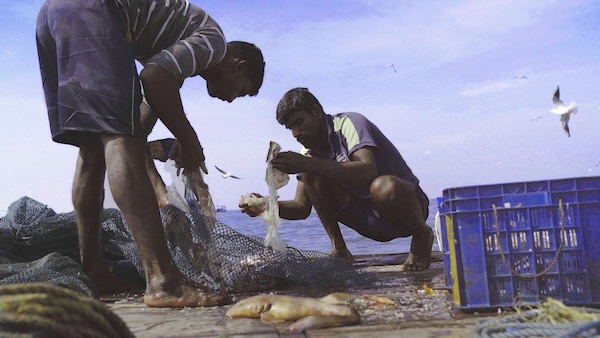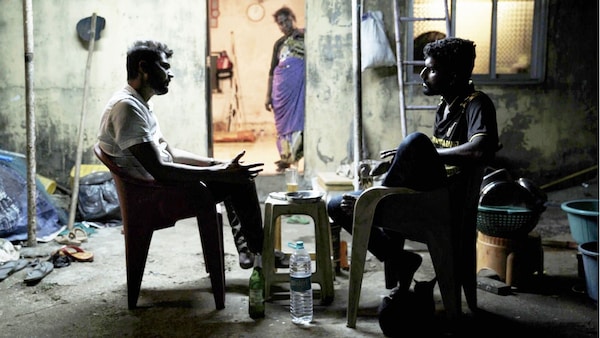Newsletter: Sarvnik Kaur's 'Against The Tide' Documents A Bittersweet Sea Change
Ishita Sengupta reports on the best from the 2023 Sundance Film Festival line-up. Here: Against The Tide.

Last Updated: 12.56 PM, Aug 21, 2024
This column was originally published as part of our newsletter The Daily Show on January 24, 2023. Subscribe here. (We're awesome about not spamming your inbox!)
***
IT IS DIFFICULT not to be reminded of Shaunak Sen’s terrific All That Breathes while watching Sarvnik Kaur’s Against The Tide. It is not just the context — Kaur’s non-fiction premiered at the ongoing Sundance Film Festival in the World Cinema Documentary Competition, precisely where the global journey of Sen’s documentary had commenced. Even the intent of the filmmakers align. Both depict an ecological fable told through the polity of human relationships.
Having said that, Kaur’s outing is a distinct work: deeply humanistic in approach and admirable in its clarity. Her thematic interest becomes all the more compelling in her refusal to take sides. In the process, she ends up underlining the exigency of modern existence where the necessity of survival has come to counter the need for conservation, all the while stressing that this crisis too is a creation of human beings. And that, more than anything else, is the tragedy.

THE MERIT OF Against The Tide lies in Kaur’s gaze, in her decision to include what she does and who she trains her lens on. This intentionality regulates the rewarding ambivalence of the documentary, in the absence of which, it could have easily been reduced to a one-note reiteration of the aftermath of climate change. The non-fiction focuses on Rakesh and Ganesh, the two friends belonging to Maharashtra’s indigenous, fishing Koli community. They are both fishermen but their means are different. Rakesh, who lives with his mother, wife and infant son, is rooted to tradition. Ganesh B Nakhawa, a seventh-generation Koli who studied in Scotland, is modern in his approach.
Even their economic standing differs. Ganesh resides in a rather upscale flat with his wife. Rakesh’s house is more basic. At some point he states that they are getting regular water supply and Ganesh advises him to build a toilet at home. Then there are ideological differences. Rakesh is more attuned to the depleting health of the marine ecosystem. His decision to fish in the shallow part of the sea and deploy seine net to catch small fish is an extension of it. Ganesh, on the other hand, has a larger crew of helpers. His wife’s family owns property in the state, his dreams are bigger. As the documentary unfolds, Ganesh contemplates using LED lights to catch fish, an efficient but hazardous technique that aids in deep sea fishing and causes a drastic depletion of resources. In 2017, the center banned its practice given that it kills small fish and, as a strategy that demands financing, endangers the livelihood of traditional fishermen.
The conflict is right here: one is morally upright and the other is dubious. One is greedy and the other is humble. But Against The Tide is not a moral lesson dressed as non-fiction. Instead, it is a deeply nuanced outing which reckons with the demands of the present while acknowledging the cause of it. Aided by Kaur’s discerning eye, the documentary places the men amidst the circumstances they are pitted against. Suddenly, the line distinguishing them ceases to matter, even when it remains discernible. Rakesh and Ganesh emerge as people who are doing what they can to survive in a world that has been exhausted beyond repair.
Shot by Ashok Meena, the outing does more than surface-level scanning. We see the men at home, interacting with their wives and kids. It is a touching swerve that underlines the similarity of their struggle. The documentary opens with the post-birth ablution of Rakesh’s son. As the narrative unfolds, the child falls severely ill and is diagnosed with a hole in his heart. Already afflicted with the problem of not earning enough through fishing in the shallow water, Rakesh decides to sell his boat. When the time comes, his mother, who keeps reminding him that Kolis fear none, sobs in the corner. His wife wipes her tears. It is such a heart-rending moment, so complete in the devastation it implies that one gets an inkling of the extent of the tragedy on display: fishing for them is not just a way of life, it is their whole life.
One would assume that Ganesh would be better off. After all, he has a car, a flat with attached bathrooms. But when the camera trains on him, you realise the lives of these men are but symptoms of an overarching crisis. As the narrative progresses, he gets increasingly buried in debt. At some point, he mortgages his wife’s gold jewelry, and later takes a hefty loan to fund equipment to fish using LED lights. Nothing comes out of it. By the time Against The Tide reaches its conclusion, he has over one crore loan to repay. Creditors have blacklisted him.
Not arbitrarily, Against The Tide is also reminiscent of the recent Netflix show, Trial By Fire. Based on the real life 1997 Uphaar fire tragedy in Delhi, where an irresponsible act by the theatre owners cost 59 innocent lives, Prashant Nair’s long-form series is a terrific exploration of the way a mishap creates circumstantial heroes and villains. Kaur operates with a similar brand of cognisance. She places the casualty of a human-created catastrophe at the foreground of her narrative and negotiates with her visual reckoning, hinting at the impossibility of pursuing morality when mortality is the point of contention.
Instances of the men fishing include scenes deep inside the water. One can see plastic bags, condoms contributing to the ocean filth. By the time the camera focuses on the faces of the fishermen, their disappointment is hard to miss. At another point, Ganesh shows his wife how fishermen outside India are rampantly using LED lights. How is it wrong if he wants to do the same? In another affecting moment, Rakesh muses, “A fisherman’s life is all about credit”.
Against The Tide then is a clear-eyed, unbiased depiction of the lives of two fishermen. Using their disparate beliefs and common struggle, the documentary highlights the growing malaise of a community caused by the unchecked greed of some and recklessness of all.
At its core, however, it is a moving portrait of friendship. Ganesh and Rakesh seem so different from each other that it is a marvel they are friends. But their polarity is precisely what contributes to the warmth of their friendship. A lot of it is unsaid but not difficult to assume. Given that Rakesh completed his education in Scotland, one understands that they were perhaps childhood friends. One left, the other could not. This is also why one feels it is his responsibility to perpetuate the principles of their community while another, with a broader vision, is more practical. And yet, Ganesh keeps visiting Rakesh. They sit by the sea, fry their fish and share a drink. The routine lends a subtext to both their personalities, mapping out who they want to be and who they could have been. Ganesh keeps telling Rakesh to venture into a deeper sea. He offers to help. Rakesh refuses. A large chunk of their conversation also involves Ganesh arguing with Rakesh about using LED lights for fishing. It is almost like Ganesh seeks Rakesh’s approval in the guise of an altercation. As if Rakesh, the less flashier of the two, is Ganesh’s moral compass.
The friendship feels like such an anomaly that eventually when they do fight, the emotionally charged confrontation compels one to look away. Ganesh taunts Rakesh of not having enough, the latter retorts he lives like a king. Ganesh halts, flashes a cruel smile and reminds him he doesn’t even have a toilet at his home. The brutality of the moment, the child-like tendency of both men to keep hurting the other because they can give a backstory to their friendship. Kaur shoots this with dignified poignancy, revealing in one bold stroke the losing battle both men are up against.
Yet, Against The Tide brims with hope. It is an unflinching snapshot of the times we are living in, the deteriorating health of the ocean. But Kaur ensures that we remember that it is also the story of a friendship, of two men tied together with their fixation with water. Given how loss-inducing the profession of fishing has become, their refusal to do anything else is akin to swimming against the tide. At least — the documentary reminds us — they have each other.

 Premium
Premium